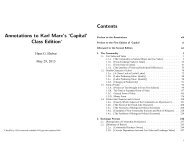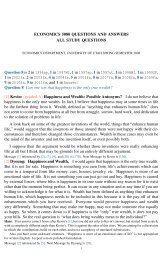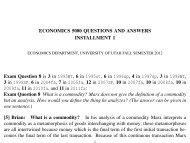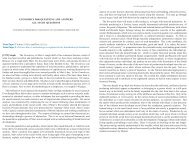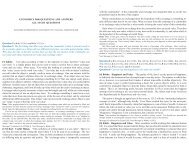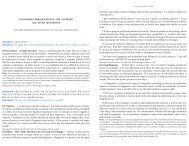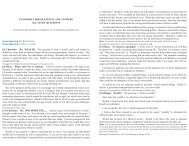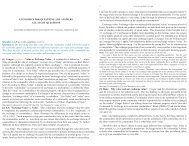Question 1 What did Marx mean with his formu - University of Utah
Question 1 What did Marx mean with his formu - University of Utah
Question 1 What did Marx mean with his formu - University of Utah
Create successful ePaper yourself
Turn your PDF publications into a flip-book with our unique Google optimized e-Paper software.
U <strong>of</strong> <strong>Utah</strong> Econ 5080 2005fa 27<br />
qualify the teeth as not having exchange-value in American society because the purpose is<br />
not to transfer ownership <strong>of</strong> the teeth.”<br />
I leave the challenge to form a market for baby teeth where they can be exchanged for<br />
other commodities. When t<strong>his</strong> occurs, please send me an urgent email so that I can take full<br />
advantage <strong>of</strong> finding teeth at a discount and selling them at a market for a premium thus<br />
establishing an exchange value. Until then it will remain a tradition which brings a smile<br />
to both the tooth fairy, the parent, and the toothless child, leaving both <strong>with</strong> a smile and the<br />
parent <strong>with</strong> nothing <strong>of</strong> social value in their possession in exchange.<br />
Hans: In your second paragraph you are overshooting your argument. The tooth fairy is not an individual quirk<br />
but a social custom. In t<strong>his</strong> respect, t<strong>his</strong> example differs from the wife-swapping example.<br />
Message [809] referenced by [949]. Next Message by Mullin is [810].<br />
[820] Tesa: graded A The tooth fairy. First <strong>of</strong> all, an exchange value is the outward<br />
manifestation <strong>of</strong> the value in a commodity. Secondly, exchange-value is social (annotations<br />
pp 18), by these terms the tooth is not an exchange-value. Assuming that the baby is laboring<br />
to produce a commodity to exchange by growing and loosing a tooth is absurd. The teeth<br />
are only valuable (or treasured) by the parent, not society as a whole. As SueGirl said (249)<br />
“The purpose <strong>of</strong> the exchange should be to transfer ownership <strong>of</strong> a commodity, not just<br />
continue a social tradition”.<br />
Hans: The tooth fairy ritual is social enough, but its purpose is not to transfer ownership.<br />
Message [820] referenced by [949]. Next Message by Tesa is [842].<br />
[835] Jerm: T<strong>his</strong> act does not give a baby tooth exchange-value because exchange-value<br />
is social, not individual. In the annotations it says, “If two individuals decide to exchange<br />
things which are commonly not exchanged, t<strong>his</strong> does not give these things exchange-value.”<br />
Another reason why t<strong>his</strong> act does not give the tooth exchange value is because in the United<br />
States <strong>of</strong> America, a tooth does not have use-value. In order for a commodity to have<br />
exchange-value, it must have use-value. Use-values are the material “carriers” <strong>of</strong> exchangevalue.<br />
Message [835] referenced by [949]. Next Message by Jerm is [1161].<br />
[862] Xerho: graded A– Yes. According to <strong>Marx</strong>, exchange value is a manifestation <strong>of</strong><br />
value embedded in a commodity, <strong>with</strong> social influences manipulating what the exchange<br />
value is in comparison to other commodities.<br />
The social tradition in the United States <strong>of</strong> exchanging a lost tooth for a quarter is a<br />
socially-derived exchange value for a commodity. While t<strong>his</strong> commodity does not intrinsically<br />
involve abstract labor going into its creation/production, that does not preclude its<br />
usefulness as a social milestone, nor its ability to stand on its own in reference to another<br />
commodity, or money in exchange.<br />
Hans: You are right, the tooth fairy is social, not an individual quirk like the wife-swapper. But you are wrong to<br />
say that the tooth stands on its own. An ordinary commodity is exchanged for its own sake, i.e., in order to transfer<br />
ownership <strong>of</strong> the thing itself. The tooth fairy ritual does not have the purpose <strong>of</strong> transferring ownership <strong>of</strong> the tooth,<br />
but it is the celebration <strong>of</strong> a milestone in the child’s development.<br />
Message [862] referenced by [949]. Next Message by Xerho is [863].<br />
[884] Matt: No, t<strong>his</strong> does not <strong>mean</strong> that baby teeth have an exchange value in society. In<br />
order for something to have an exchange value it must be a commodity. Due to the fact that<br />
no labor was put into it what so ever, it is not a commodity. Also getting money from the<br />
tooth fairy (mother) is a custom that is native here in America. Since it is merely a custom<br />
28 2005fa Econ 5080 U <strong>of</strong> <strong>Utah</strong><br />
that <strong>mean</strong>s that t<strong>his</strong> kind <strong>of</strong> exchange is supposed to take place. <strong>Marx</strong> says that exchangevalue<br />
resides in the commodity itself. The exchange-value <strong>of</strong> commodities themselves are<br />
not embedded in a bigger social ritual. So ultimately the exchange does not take place<br />
because both sides are benefiting or in some way trying to. In the exchange, one side is<br />
benefiting because that’s what is expected due to society.<br />
Message [884] referenced by [949]. Next Message by Matt is [886].<br />
[901] Miron: Baby teeth don’t have exchange value. It is a custom in society that has<br />
been passed on from generation to generation. The parents are simply acting as though it<br />
is a custom. The main reason why baby teeth don’t carry exchange value is because they<br />
don’t have abstract human labor. There would be an actual exchange value if the tooth fairy<br />
<strong>did</strong> exist, because it would be a specific amount <strong>of</strong> money that the tooth fairy would give<br />
for every tooth a baby lost. The value <strong>of</strong> these teeth would thus have monetary value for the<br />
baby and an actual use value for the tooth fairy.<br />
Message [901] referenced by [949]. Next Message by Miron is [902].<br />
[913] Pete: graded B– One must determine what kind <strong>of</strong> exchange value baby teeth have.<br />
Is there a market for them? No, there is no labor involved. But in the Tooth Fairy world<br />
they must have some exchange value. The TF (tooth fairy) must understand the concept <strong>of</strong><br />
capitalism and how things are only good for trading or bartering. As it is in the real world<br />
the only value a baby tooth has is sentimental. Since the TF is thousands <strong>of</strong> years old he/she<br />
probably has gone through all the theories <strong>of</strong> exchange. <strong>Marx</strong> is just one <strong>of</strong> them.<br />
Message [913] referenced by [949]. Next Message by Pete is [1013].<br />
[949] Hans: Exchange value. Let us try the following definition and see how far it takes<br />
us:<br />
A good is an exchange-value in a certain society if it is socially customary<br />
in that society to use t<strong>his</strong> good as a <strong>mean</strong>s to acquire other goods through<br />
exchange.<br />
I chose t<strong>his</strong> <strong>formu</strong>lation in order to emphasize the following points:<br />
(1) it must be a social custom, not just an individual decision to exchange the good. If you<br />
and I decide to exchange a piece <strong>of</strong> paper filled <strong>with</strong> my doodles for your fingernail clippings,<br />
then it is entirely possible to make t<strong>his</strong> exchange, but those things are not exchange-values<br />
(assuming I am not Picasso and you are not Marilyn Monroe). Individuals can do many<br />
things which are not social customs, and we will not be struck by lightning because we<br />
exchange things which are not exchange-values.<br />
(2) the exchange <strong>of</strong> the goods must have the purpose to transfer ownership <strong>of</strong> the goods.<br />
If a newly-wed couple exchanges their wedding bands during the marriage ceremony, t<strong>his</strong><br />
is a socially sanctioned exchange and not just an individual decision, but the purpose <strong>of</strong><br />
t<strong>his</strong> exchange is not to transfer ownership <strong>of</strong> the goods, but t<strong>his</strong> exchange symbolizes the<br />
marriage relationship.<br />
(3) I deliberately wrote “a good is exchange-value” instead <strong>of</strong> “a good has exchangevalue”<br />
because at t<strong>his</strong> point it does not matter why these things can be exchanged. The<br />
important point is that ownership <strong>of</strong> the good is commonly transferred through exchange,<br />
regardless <strong>of</strong> the reason. If I write “a good has exchange-value,” then it sounds as if I was



